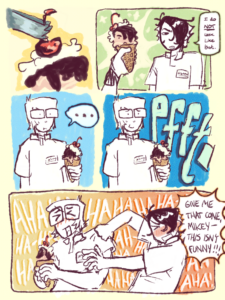Professor of Economics Steven Landsburg used microeconomic principles to argue that more sex is safer sex in a lecture Monday night in front of a packed Dewey lecture hall. Landsburg is a published author who researches micro economic principles and is a staunch supporter of free trade.
Although Landsburg is an accomplished economist, he spoke in a way that those who had no economic background would be able to understand.
Landsburg drew from well-known principles of economics that appear in his book, ‘More Sex is Safer Sex,” published in 2007.
‘Does the same [principle] apply for casual sex?” Landsburg asked during the lecture. ‘Should there be more or less?”
To help prove his point, Landsburg likened the notion that polluters do not care about the pollution that others have to breathe to the economics of sex.
He claimed that people carrying sexually transmitted infections do not care about the diseases others receive from them.
The way to correct this imbalance, Landsburg said, is to add incentives for cautious people to have sex. He suggested distributing library cards to those having sex, as cautious people tend to prefer library cards more than promiscuous people.
Landsburg cited Michael Kramer, a Harvard professor well-versed in epidemiology, statistics and economics to help support his argument.
The conclusion was that if more cautious people increased the amount of times they had sex to 2.25 times per year, the rate of the spread of AIDS and other sexually transmitted infections would significantly decrease.
The underlying conclusion of the lecture was that, in society’s view, infected people have too much sex, because of the external costs they impose on other people who have casual sex.
The opposite is true for cautious people. They confer a benefit on the sex pool because sex with them is safe, and the worry or chance of getting a disease is relieved.
Landsburg also provided a sneak peek into a future book, which currently lacks a title but is subtitled ‘Ideas of Mathematics, Physics, and Economics to Answer the Broad Questions about Philosophy.” The book is set for publication in September.
Sophomore Benjamin Willinsky enjoyed Landsburg’s unique view of economics.
‘I thought the lecture was very informative,” he said. ‘I have never experienced economics in an original and thought-provoking manner such as this.”
The lecture was sponsored by the Undergraduate Finance and Economics Council.
President of the Undergraduate Finance and Economics Council and junior Milo Spirig cited Landsburg’s popularity among undergraduates and accomplishments in inviting him for the lecture.
‘Students seem to really like him and he is a very good speaker,” he said.
The UFEC will be holding the third part of the six-part lecture series with a lecture by Professor of Economics Matt DiBiase.
Josephson is a member of the class of 2011.
Additional reporting by Adrian Flanders.
